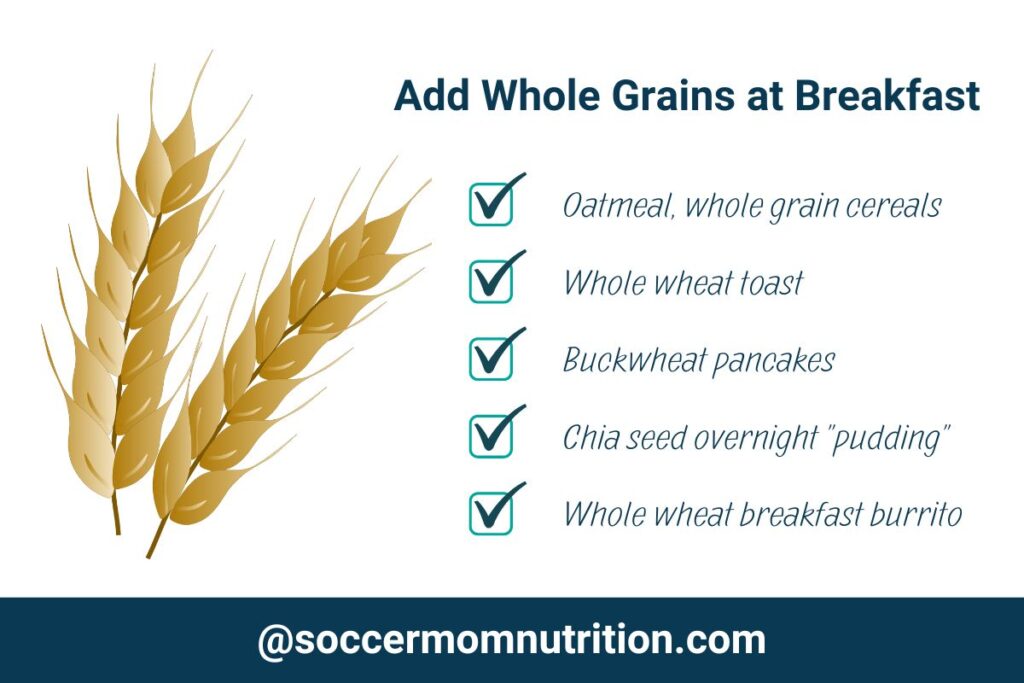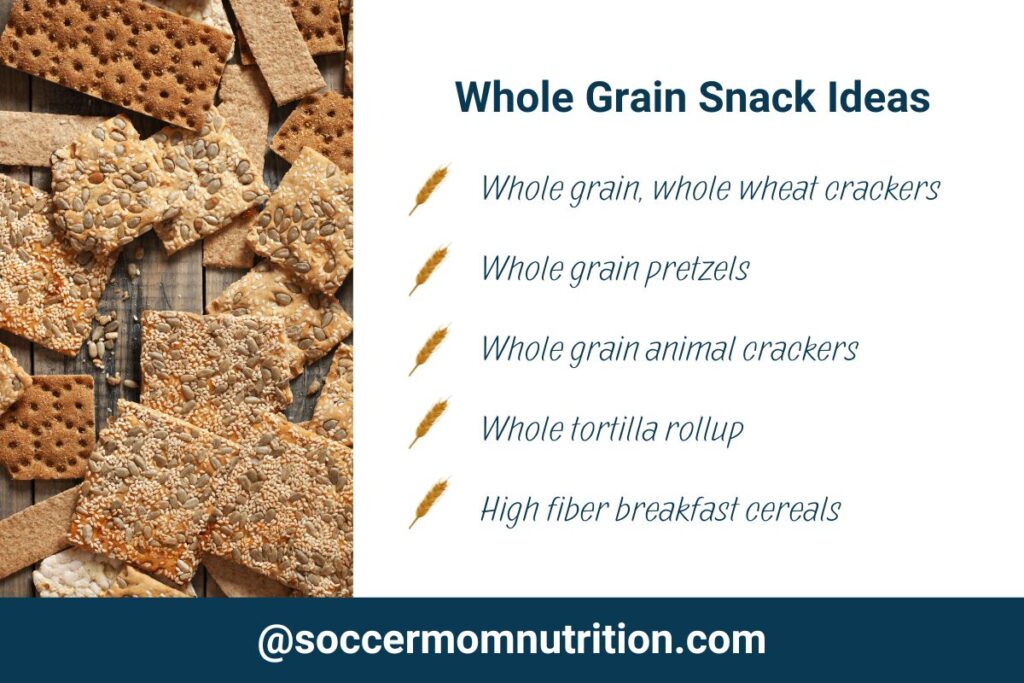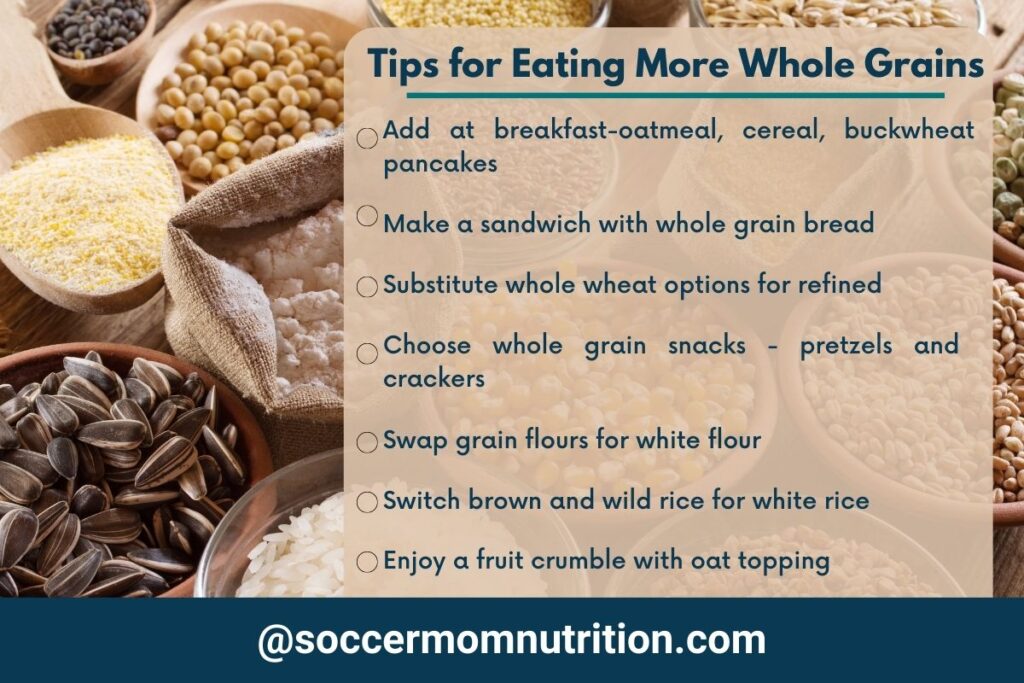How to Eat More Whole Grains-11 Easy Tips
As part of your sports performance nutrition plan you’ll want to learn how to eat more whole grains as part of your daily routine. Whether you’re in or out of season, whole grains should be part of every athlete’s diet plan for healthy eating.
Whole grains contain high amounts of fiber which supports digestion and increases the diversity of the gut microbiome. (1) Also, they help you feel fuller longer as fiber slows digestion and helps regulate blood sugar.
Additionally, whole grains have vitamins, including antioxidants, and minerals linked to preventing disease and supporting the immune system. (2)
Although it’s recommended to eat at least three servings of whole grains each day most people only eat about one serving. (3)
Eating more whole grains every day will support your overall health as well as ensure you’re getting the nutrients needed to support your athletic activities.
Have you wondered how to eat more whole grains each day?
Increase whole grains at meals
Join the breakfast club. Breakfast is one of the easiest and most important meals of the day for athletes. It’s also one of the easiest meals to add in high fiber, whole grain foods.
Great options include whole grain toast, whole wheat english muffins, waffles, high fiber breakfast cereals, overnight oats, oatmeal or chia seed pudding. Top these with berries and nuts to add fiber and antioxidants.

Stretch your time. Plan ahead and prep some meals so that you can have easy to grab whole grains throughout the week. Cook extra whole wheat pasta, brown rice, quinoa or your favorite grain and use throughout the week.
Make a meal in a minute. Spread pizza sauce on a whole grain bagel or english muffin, add low fat cheese, veggies and your favorite spices. Broil until the cheese is bubbly.
Pack a lunch. Make a hearty sandwich on whole wheat bread. Add character to the with veggies like crunch water chestnuts, roasted red peppers, marinated portabello mushroom and mixed greens. Check out our blog post on healthy lunch box ideas.
Make whole grains one of your snacks
Pace yourself. Eating healthy snacks throughout the day along with performance plate meals will help you to get enough energy and fiber throughout the day.
Adding fiber to each snack and meal will help you to maintain blood sugar levels and keep you feeling fuller longer. Stock up on carbohydrate rich snacks for mini meals.

Get cracking. Keep a box or bag of whole wheat pretzels, crackers, animal crackers or graham crackers for quick fiber rich snacks to curb hunger between classes or before practice.
Bag it. Bags of your favorite whole grain breakfast cereals make easy portable snacks. Stash a bag in your gear bag and in your desk or locker.
Roll it up. Sprinkle cheese on a whole wheat tortilla and pop in the microwave for a few seconds. Roll up and dip in salsa for a healthy, fast break snack. Pack on the fiber by adding some beans or dipping in guacamole.
Find ways to add in whole grains
Substitute or swap. Swap out half of a refined grain for a whole wheat or whole grain option. Instead of making pancakes with white flour, change the recipe and make half of the flour whole wheat, oat flour or buckwheat flour.
Add it in. Add whole grains like barley, quinoa, chia seeds to soups. Sprinkle cooked quinoa, wild rice or other grains, like wheat berries, on salads for added texture.
Enjoy dessert. Make a fruit crumble with crumbled oat toppings, add a sprinkle of granola over your ice cream or frozen yogurt. Opt for graham crackers, fig bars or animal crackers.

Conclusion
Adding whole grains to your diet doesn’t take too much effort. Find some easy ways to incorporate the tips above. Making small changes at throughout the day and at different meals can have a big impact on your overall health.
What are your favorite whole grains?
Stephanie Magill, MS, RD, CD, FAND has over 22 years of experience in public health and nutrition. As a performance registered dietitian nutritionist, Stephanie specializes in sports nutrition and provides simple and actionable information so that athletes can be well fueled for high performance on and off the field. Stephanie has a Master’s Degree in Nutrition and is a Fellow of the Academy of Nutrition and Dietetics.

